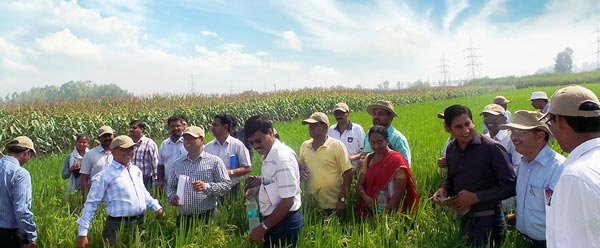
Scientists need to capture and refine farmers’ conservation agriculture innovations. This recommendation came from the National Travelling Seminar on Conservation Agriculture held at the Indian Agricultural Research Institute (IARI) from 16 to 25 September. The event was jointly organized by the Natural Resource Management division of the Indian Council of Agricultural Research (ICAR), CIMMYT and the Borlaug Institute for South Asia (BISA).
The seminar evaluated existing conservation agriculture research in India to link different institutions, identify research gaps and decide on future priorities of conservation agriculture research for development. “Since the conservation agriculture principles are sitespecific, this travelling seminar gave the opportunity to various scientists from multiple disciplines and institutes to come together to discuss them onsite and harmonize the results,” said M.L. Jat, CIMMYT senior cropping systems agronomist and coordinator of the seminar. An ICAR grant for conservation agriculture research supported the event.
M. Dadlani, joint director of research for IARI, talked about the crucial role IARI —India’s premier agricultural research institute— played in starting conservation agriculture practices. They began experimenting with conservation agriculture in 2005, and, in 2010, “conservation agriculture trials were started at its research farms under a challenge program involving many multidisciplinary scientists,” Dadlani said. H.S. Gupta, director of IARI, highlighted the need for a common, neutral platform for policy makers, researchers, private sector representatives, non-governmental organizations, CGIAR institutions and farmers to assess local and regional needs, exchange information, and define priorities for the implementation of conservation agriculture, especially for resource-poor smallholder farmers. “Mining nutrients from the soil is a major concern,” he said. “At Pusa, there has been an increase in system productivity and the length of the cropping season due to conservation agriculture adoption. These factors prompt the idea of making conservation agriculture a flagship program at IARI.”
More than 25 senior researchers from 11 ICAR institutions, state agricultural universities and CIMMYT visited conservation agriculture research platforms in different cropping systems and ecologies (irrigated, mixed and rain-fed systems) at New Delhi, Karnal, Ludhiana, Jabalpur and Patna. The scientists and farmers participated in interactive discussions. Farmers should receive a clear message from all institutions, participants said, and therefore need the convergence of investments and research. Farm innovations also need to be aligned with the latest scientific developments. “The breeders have to come out with new materials for a specific challenge,” said Alok K. Sikka, ICAR deputy director general. “Conservation agriculture goes far beyond zero-tilling and resource conservation technologies. Conservation agriculture is a package that has to be followed in a systems approach.”
Areas identified for in-depth strategic research include the study of water-nutrient and crop-livestock interactions under conservation agriculture, design and development of conservation agriculture machinery suited to different farming systems and a better understanding of weed, disease and pests in conservation agriculture conditions to hasten the development of integrated pest management strategies.
 Climate adaptation and mitigation
Climate adaptation and mitigation 
